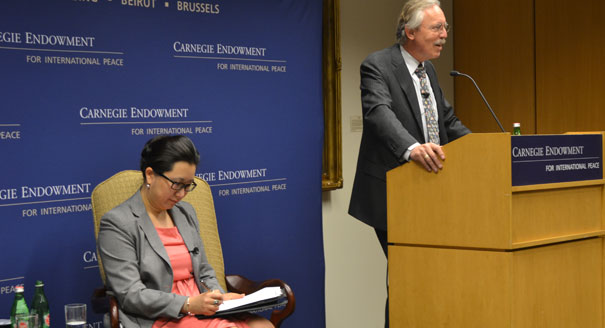Registration
You will receive an email confirming your registration.
The Netherlands will host the next Nuclear Security Summit at The Hague on March 24 and 25, 2014. The summit process, launched in 2010, responds to growing awareness of the risk that non-state actors and terrorist groups might acquire weapons-usable fissile material. It seeks to further the goal of securing all nuclear material worldwide through engagement with key heads of state and international organizations. The Carnegie Endowment hosted Ambassador Piet de Klerk, Sherpa to the 2014 Nuclear Security Summit and Netherlands ambassador to Jordan, to discuss the continued importance of nuclear security and how the summit at The Hague will build on previous meetings in Washington and Seoul. Togzhan Kassenova moderated.
A Global Challenge
- A Growing Threat: Over the past several decades the amount of nuclear material in the world has grown considerably, de Klerk said. Despite the threat presented by unsecured nuclear material, the safeguards to control this material remain weak.
- Weak International Laws: Important international laws that could increase the security of at-risk nuclear material remain not in force. De Klerk pointed to the example of the 2005 amendment to the Convention on the Physical Protection of Nuclear Material, which is not yet legally binding due to an insufficient number of state ratifications.
Achievements in Seoul
De Klerk highlighted the major achievements of the 2012 Seoul Nuclear Security Summit:
- Strengthened the International Legal Regime: In the run up to the summit in Seoul many countries ratified important nuclear treaties, such as the amended Convention of the Physical Protection of Nuclear Material and the International Convention on the Suppression of Acts of Nuclear Terrorism.
- Increased Activity in International Bodies: In Seoul, progress was made on the 2010 and 2013 IAEA nuclear security plans and the G8 countries strengthened their commitment to the Global Partnership Against the Spread of Weapons and Materials of Mass Destruction.
- Consolidated and Minimized Nuclear Material: At the Nuclear Security Summit in Seoul many countries reported reductions in state inventories of highly enriched uranium (HEU). However, de Klerk cautioned, HEU stockpile reductions in some countries should be understood in the international context of increasing stockpiles in others.
- Next Steps Forward: Participants arranged for future meetings and training courses that will serve to strengthen safeguards against the endangerment of nuclear material.
Priorities for the Hague Summit
De Klerk defined the main priorities of the 2014 Hague Nuclear Security Summit:
- Strengthen the International Legal Regime: Bringing the amended Convention on the Physical Protection of Nuclear Material into force would constitute a critical success of The Hague Nuclear Security Summit, he said. The entry into force of this convention would extend its jurisdiction beyond the transport of nuclear material to the storage and use of nuclear material as well.
- Improve Nuclear Security Assurances: De Klerk suggested that a dialogue to provide solutions for navigating the inherent tension between protecting state secrets and improving assurances about the physical security of state nuclear material would significantly contribute to improving the confidence about the security of nuclear materials. De Klerk also noted that the International Atomic Energy Agency, which has recently placed a high priority on nuclear security initiatives, could also play a role in verifying the security of state nuclear materials and provide state-based recommendations.
- Improve Government–Industry Interface: De Klerk noted the importance of working with experienced industry partners to address nuclear material governance issues.
- Broaden the Mandate: The 2010 and 2012 Nuclear Security Summits emphasized the security of nuclear fissile material and did not sufficiently address radioactive material and military sources of nuclear material, de Klerk said. He pointed out that both these sources can present major security threats and expressed his hope that the 2014 summit will address the security of these materials to a greater degree.
Challenges Ahead
De Klerk noted that while the countries participating in the Nuclear Security Summit share the same broad objectives, they often have different visions of how best to secure nuclear material. He pointed out that some countries seek the abolition of nuclear material, while others argue for a closed fuels cycle, and still others for stronger regulation. Navigating these divergent national policies to arrive at productive solutions all countries can agree upon will be the largest challenge at the Nuclear Security Summit in 2014.
